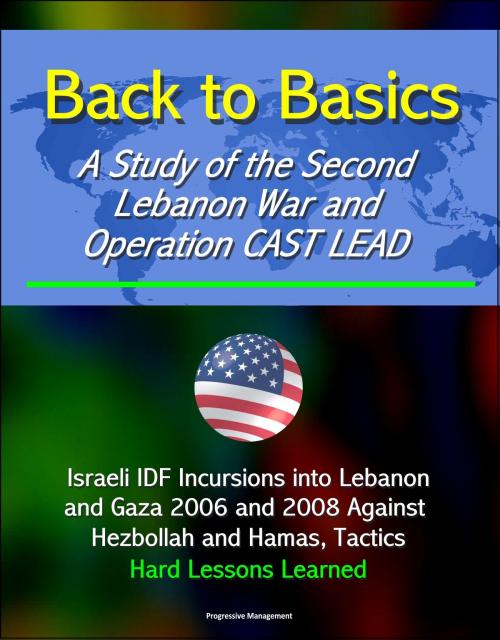Back to Basics: A Study of the Second Lebanon War and Operation CAST LEAD - Israeli IDF Incursions into Lebanon and Gaza 2006 and 2008 Against Hezbollah and Hamas, Tactics, Hard Lessons Learned
Nonfiction, Social & Cultural Studies, Political Science| Author: | Progressive Management | ISBN: | 9781310960543 |
| Publisher: | Progressive Management | Publication: | November 22, 2014 |
| Imprint: | Smashwords Edition | Language: | English |
| Author: | Progressive Management |
| ISBN: | 9781310960543 |
| Publisher: | Progressive Management |
| Publication: | November 22, 2014 |
| Imprint: | Smashwords Edition |
| Language: | English |
The Israeli incursions into Lebanon in mid-2006 and into Gaza in late 2008/early 2009 are important studies in contrasts. During the first, often termed "the Second Lebanon War," Hezbollah fought Israeli Defense Forces (IDF) seeking hostage rescue and retribution to a bloody standstill. During the second, Hamas enjoyed far less success against the same forces avowedly in pursuit of only self-defense.
These and other differences notwithstanding, the two conflicts are both similar and linked in several important respects. Each witnessed protagonists that were anxious—even desperate—to win prestige and demonstrate the capacity to safeguard survival. Each also confronted a conventional armed force with antagonists, Hezbollah and Hamas, which are possible prototypes for the non-state adversaries the US could face in the future. Moreover, each conflict witnessed the successful prosecution of information operations in ways that highlighted the importance of the "new media" in contemporary war. At the same time, the conflicts were linked intellectually, to the extent that the IDF studied lessons learned from the first, especially in the realm of information operations, to condition planning and application for the second.
The current work metaphorically extends IDF lessons learned to distill insights from the two conflicts for the education of US Army leaders. Produced in a short period of time, this anthology represents the collaborative effort of several organizations, including CAC's Center for Army Lessons Learned, the Combat Studies Institute, the US Army's Information Operations Proponent, the Command and General Staff College, and TRADOC's Intelligence Support Activity. Relying on a mixture of primary and secondary materials from a variety of sources and agencies, the authors have combined multiple perspectives under the roof of a single unclassified study. Like the classics, it reaffirms the importance of basics and constant introspection as important prerequisites for military success.
Introduction * Chapter 1 * Hard Lessons Learned * The 2006 Hezbollah-Israeli War * "Training, Training and Training As Well As Innovative Thinking": The IDF Response to the 2006 War With Hezbollah * The Gaza Conflict * Conclusion * Chapter 2 * Hamas and Hezbollah: A Comparison of Tactics * Introduction * Application of the PMESII+PT Variables * Hamas and Hezbollah * Political * Military * Economic * Social * Infrastructure * Information * Physical Environment * Time * The 2006 Second Lebanon War * Hezbollah TTPs * 2008-2009 Hamas/Israeli Conflict * Hamas TTPs * Conclusion * Chapter 3 * The Tactics of Operation CAST LEAD * Scope * Revisiting the Second Lebanon War * The Intervening Years, 2006-2008 * Operation CAST LEAD—Implementing Lessons Learned * Conclusion * Chapter 4 * Information Strategies Against A Hybrid Threat * Introduction * The Rising Importance of the Information Battle * The Adversary's Strategy * The Second Lebanon War: A Battle of Strategic Narratives * Emerging Lessons for the United States Army * An Initial Review of the Implications * Conclusion
The Israeli incursions into Lebanon in mid-2006 and into Gaza in late 2008/early 2009 are important studies in contrasts. During the first, often termed "the Second Lebanon War," Hezbollah fought Israeli Defense Forces (IDF) seeking hostage rescue and retribution to a bloody standstill. During the second, Hamas enjoyed far less success against the same forces avowedly in pursuit of only self-defense.
These and other differences notwithstanding, the two conflicts are both similar and linked in several important respects. Each witnessed protagonists that were anxious—even desperate—to win prestige and demonstrate the capacity to safeguard survival. Each also confronted a conventional armed force with antagonists, Hezbollah and Hamas, which are possible prototypes for the non-state adversaries the US could face in the future. Moreover, each conflict witnessed the successful prosecution of information operations in ways that highlighted the importance of the "new media" in contemporary war. At the same time, the conflicts were linked intellectually, to the extent that the IDF studied lessons learned from the first, especially in the realm of information operations, to condition planning and application for the second.
The current work metaphorically extends IDF lessons learned to distill insights from the two conflicts for the education of US Army leaders. Produced in a short period of time, this anthology represents the collaborative effort of several organizations, including CAC's Center for Army Lessons Learned, the Combat Studies Institute, the US Army's Information Operations Proponent, the Command and General Staff College, and TRADOC's Intelligence Support Activity. Relying on a mixture of primary and secondary materials from a variety of sources and agencies, the authors have combined multiple perspectives under the roof of a single unclassified study. Like the classics, it reaffirms the importance of basics and constant introspection as important prerequisites for military success.
Introduction * Chapter 1 * Hard Lessons Learned * The 2006 Hezbollah-Israeli War * "Training, Training and Training As Well As Innovative Thinking": The IDF Response to the 2006 War With Hezbollah * The Gaza Conflict * Conclusion * Chapter 2 * Hamas and Hezbollah: A Comparison of Tactics * Introduction * Application of the PMESII+PT Variables * Hamas and Hezbollah * Political * Military * Economic * Social * Infrastructure * Information * Physical Environment * Time * The 2006 Second Lebanon War * Hezbollah TTPs * 2008-2009 Hamas/Israeli Conflict * Hamas TTPs * Conclusion * Chapter 3 * The Tactics of Operation CAST LEAD * Scope * Revisiting the Second Lebanon War * The Intervening Years, 2006-2008 * Operation CAST LEAD—Implementing Lessons Learned * Conclusion * Chapter 4 * Information Strategies Against A Hybrid Threat * Introduction * The Rising Importance of the Information Battle * The Adversary's Strategy * The Second Lebanon War: A Battle of Strategic Narratives * Emerging Lessons for the United States Army * An Initial Review of the Implications * Conclusion















